Exchanging Community-led Approaches to Supporting Food Knowledge in Alaska and the US Southwest
By: Noor Johnson, University of Colorado Boulder; Mary Beth Jager, University of Arizona; Stephanie Russo Carroll, University of Arizona; Eva Dawn Burk, Tlaa Deneldel Community Group, Orville H. Huntington, retired; Lydia L. Jennings, Arizona State University; Kaare Sikuaq Erickson, Ikaaġun Engagement; Max Taylor, Natwani Coalition; Dan Ferguson, University of Arizona
In September 2022, the National Science Foundation (NSF) supported Indigenous Foods Knowledges Network (IFKN) gathered on the Hopi Reservation for our first in-person meeting since before the COVID-19 pandemic. As we drove onto Hopi lands, IFKN members saw green grass growing at a time of year when for more than half a century, the earth had been dry and brown. Plentiful rainfall over the summer that extended beyond the traditional monsoon period created lush pasturelands for Hopi ranchers, but was a mixed blessing for farmers. Although they welcomed rain during a period of prolonged drought, rain out of season can wreak havoc on crops, washing away newly planted seeds or stripping delicate blossoms from fruit trees in the spring. As Hopi Elder and farmer, Max Taylor, shared with us, disrupted seasonal cycles were one of the indications of climate change in the region.
In addition to discussing disrupted seasonal cycles, our intertribal exchange between Arctic and southwest Indigenous Peoples discussed challenges to food sustainability and security from the COVID-19 pandemic, recognition of infrastructure needs, and the ways community members are stepping forward to create community-based solutions, including watershed clean-up, youth educational programming, and sustainable home design. Members from both regions recognized that supporting food knowledge is an important part of community health, community revitalization and community-led futures.
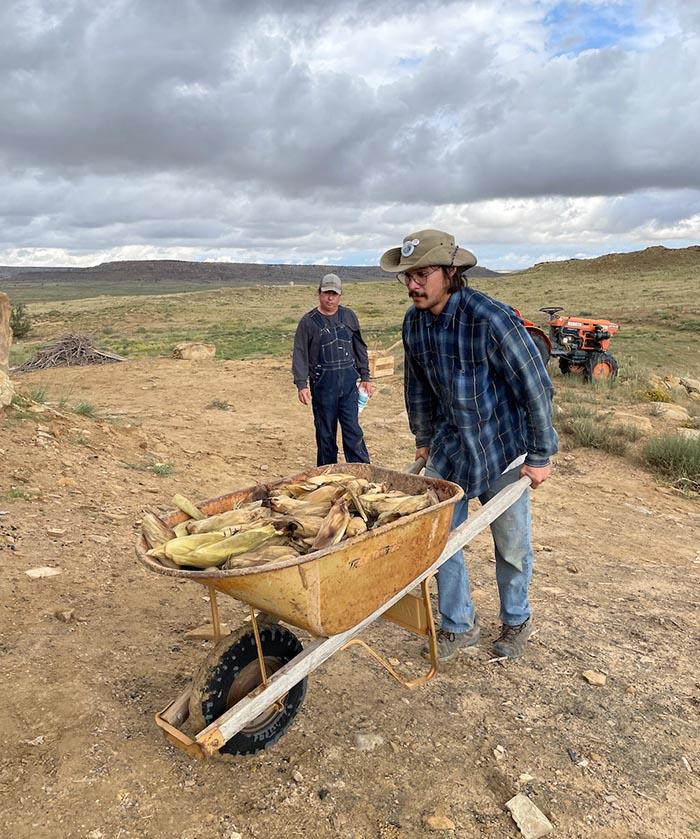
IFKN is a research coordination network that began in 2017, supported by funding from the National Science Foundation (Office of Polar Programs award 1745499). IFKN brings together Indigenous leaders and academics from the Arctic and sub-Arctic and the US Southwest to exchange knowledge about Indigenous food systems and the local efforts that sustain them (Jager et al. 2019). Each gathering has a local host that invites the network to learn from place-based knowledge traditions; at Hopi, we were hosted by Monica Nuvamsa and Samantha Honani from the Hopi Foundation and Kyle Nutumya, Roberta Sequi, Jayson Paymella, and Max Taylor from the Natwani Coalition, a Hopi Foundation project dedicated to supporting Hopi farmers and traditional Hopi farming methods. IFKN steering committee member, Michael Kotutwa Johnson, a Hopi researcher who works for the University of Arizona, hosted us for meals at his farm in the house he built using traditional architecture. Over four days, we visited farm lands and learned about dryland farming methods and terrace gardens, enjoyed some of the many foods prepared with Hopi corn and cornmeal as well as other local crops such as beans, tomatoes, and peppers, and were welcomed with warm hospitality by families and individuals who are passionately supporting the continuity of Hopi food knowledge and practices. Underpinning their work is the conviction that Hopi knowledge holds both spiritual and practical relevance that can carry the Hopi people forward through periods of challenge and change.
Each gathering of the IFKN network is unique because it is deeply informed by the place where we gather, the community members and organizations that host us and share with the group about food sovereignty and resilience practices in their community, and the individuals who come together as part of the network — each gathering brings both new and returning members. At our first meeting at Gila River in 2017, hosted by Althea Walker and the Gila River Indian Community's Department of Environmental Quality, we visited the intricate canal system that brings water to irrigate farms, rebuilt after the tribe won a landmark settlement in 2004 that returned waters to their lands that were diverted upstream more than a century ago.
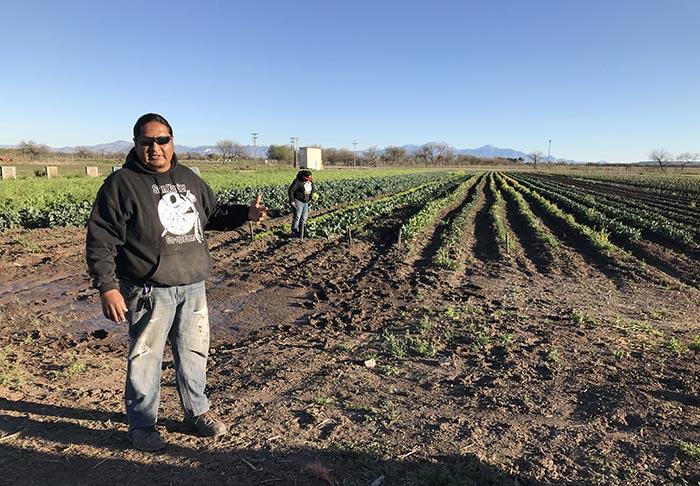
In March, 2019, Amy Juan hosted us in Tohono O'odham, where we visited farms and agricultural cooperatives focused on teaching youth to grow crops using traditional farming methods. We met with one of the tribe's leading climate experts, Dr. Selso Villegas, who is working to address current and future water shortages brought about by a complex constellation of political, settler colonial, and ecological factors.
At Nay'dini'aa Na'Kayax' (Chickaloon Village), hosted by Shawna Larson and the Nay'dini'aa Na'Kayax' Traditional Council, we were welcomed into fish camp in June 2019, learning to filet fish and identify medicinal plants alongside the community's children and supporting their learning along with our own. Paulina Feodoroff, a Skolt Sami leader from northern Finland who hosted members of the IFKN steering committee in her community in 2018, traveled to Chickaloon to spend time with her IFKN "sisters," and to exchange knowledge about river restoration efforts in both regions that support healthy ecosystems and healthy fish.
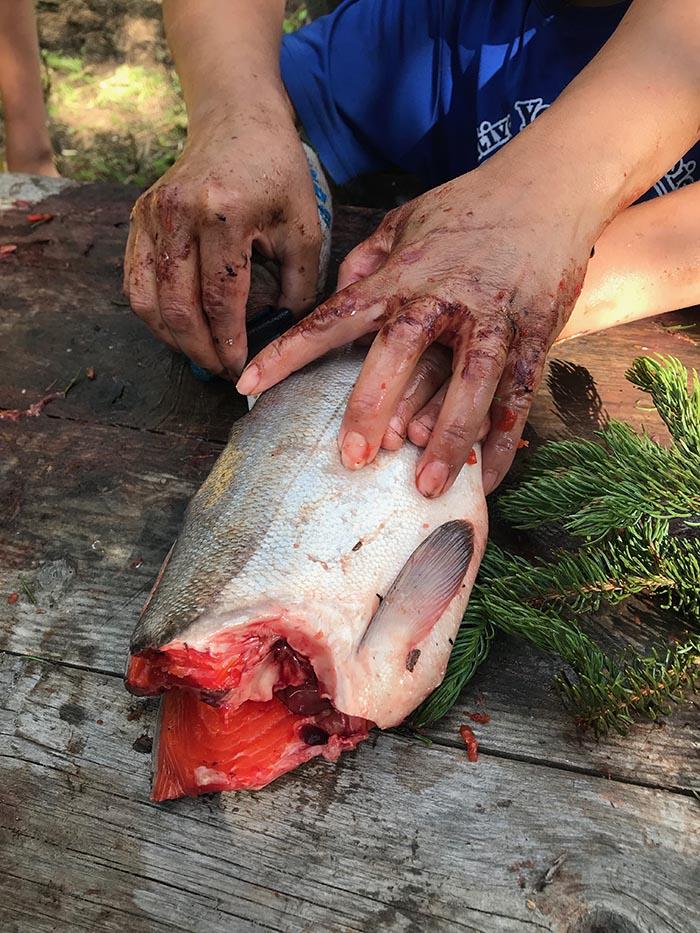
Across all the places that the IFKN network has gathered, community members have shared local strengths, solutions, and innovations to produce culturally relevant food locally in spite of various disruptions, shocks, and systemic challenges. These include environmental changes driven by climate change, extractive industry, and large-scale farming and commercial fishing as well as disruptions to traditional practices and generational teachings from the introduction of state-led, colonial education and governance systems. In 2020, COVID-19 temporarily disrupted some of the food practices that we learned about and engaged in as a network, such as working in large family groups to harvest foods, and gathering and sharing food in community to mark important milestones and uphold spiritual and family commitments and obligations (Johnson et al. 2021). Some of the strategies that our network has learned about and focused on to support food security and sovereignty include:
- Investing in local, Indigenous-led organizations and institutions, which play a critical role supporting knowledge transfer and training for the next generation of Indigenous farmers, fishers, hunters, and harvesters.
- Creating opportunities for children and youth to learn about Indigenous food practices and knowledge supported by Elders and other knowledge bearers helps ensure that skills are passed on to the next generation. This can happen through cultural and language education, fish camp, and apprenticeship programs; these opportunities extend access to young people who may not have active harvesters in their own households.
- Upholding knowledge sovereignty of Indigenous communities by identifying community priorities and needs, respecting tribal and community research protocols, which may include limitations on who should have access to certain kinds of knowledge and how plants and animals and the land should be cared for, and putting community members in leadership roles for research projects related to food systems, ecosystems, and food governance.
- Creating opportunities to gather in extended family and community groups is an important part of food knowledge systems; food is woven into the fabric of social life and supports and extends social connections. These gatherings play a role in food security because they help distribute food across communities and because they help harvesters and food producers understand the significance and importance of their work.
In late June 2023, the IFKN network gathered again for a fish camp, but this time in Nenana, hosted by Eva Dawn Burk with support from IFKN steering committee members, Kaare Sikuaq Erickson and Orville Huntington. We learned about the fish crisis in Alaska, in which climate change and commercial fishing have led to the collapse of fish populations in many parts of the state. Kaare Sikuaq Erickson led an activity about harpoon technology that Inupiaq innovated many generations ago and that is still used for marine mammal hunting in the North Slope. We visited the land Eva Burk and a group of emerging farmers organized to purchase through a State of Alaska land sale in 2022; the group has started a community organization, Tlaa Deneldel, to learn about sustainable farming methods that can support food security for tribes along the river system in Interior Alaska. We enjoyed telling stories around the fire and sharing meals of salmon, caribou, moose, and goose stew, herring eggs on seaweed, beluga and bowhead muktuk, berries, akutaq—a dish made with whipped moose fat, white fish, seal oil, and berries—and other traditional foods from Alaska, as well as Hopi tea and piki bread from Hopi.
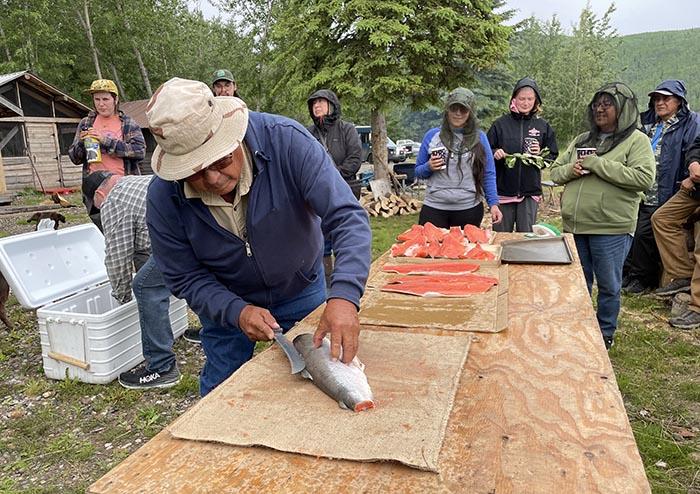
As we reflect on these past six years of IFKN, we are grateful for the gift of being welcomed as guests on Indigenous lands, and also the rich support that the network provides each of us when we come together. It is an opportunity to refresh our spirits through hands-on learning and being together in community and place. These IFKN gatherings also support food security by energizing and refueling individuals who are leaders in their own community work, and by offering new ideas and examples of how this important work can be done. We are deeply grateful for all that we have learned together and look forward to finding new ways to connect, learn, and share in the future.
More information, including Food and Knowledge Stories and recent events, are found on the IFKN website.
References
Jäger, M. B., D. Ferguson, O. Huntington, M. Johnson, N. Johnson, A. Juan, S. Larson, et al. 2019. "Building an Indigenous Foods Knowledges Network Through Relational Accountability." Journal of Agriculture, Food Systems, and Community Development, 1–7. https://doi.org/10.5304/jafscd.2019.09b.005
Johnson, N., K. S. Erickson, D. B. Ferguson, M. B. Jager, L. L. Jennings, A. R. Juan, S. Larson, W. K. S. Smythe et al. 2021: The Impact of COVID-19 on Food Access for Alaska Natives in 2020. Arctic Report Card 2021, T.A. Moon, M.L. Druckenmiller, and R.L. Thoman, Eds. https://doi.org/10.25923/5cb7-6h06
About the Authors
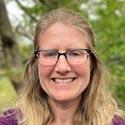 Noor Johnson, IFKN Principal Investigator, is a research scientist at the National Snow and Ice Data Center (NSIDC), University of Colorado Boulder, where she leads several international networks that support community-driven research on environmental change, Indigenous Knowledge documentation and co-production of knowledge, and food security and sovereignty. Johnson has previously conducted research in northern Canada on environmental knowledge production and mobilization and social and environmental justice issues in contemporary environmental governance.
Noor Johnson, IFKN Principal Investigator, is a research scientist at the National Snow and Ice Data Center (NSIDC), University of Colorado Boulder, where she leads several international networks that support community-driven research on environmental change, Indigenous Knowledge documentation and co-production of knowledge, and food security and sovereignty. Johnson has previously conducted research in northern Canada on environmental knowledge production and mobilization and social and environmental justice issues in contemporary environmental governance.
 Mary Beth Jäger (Citizen Band Potawatomi) was a research analyst for the Native Nations Institute (NNI) at the Udall Center for Studies in Public Policy at the University of Arizona. While at the UA's NNI Mary Beth's work expanded across a diverse range of Indigenous governance areas such as food sovereignty and Indigenous research methods. Mary Beth has been a Co-PI for IFKN and the IFKN COVID-19 project. She is still unsure of her next steps post working at NNI.
Mary Beth Jäger (Citizen Band Potawatomi) was a research analyst for the Native Nations Institute (NNI) at the Udall Center for Studies in Public Policy at the University of Arizona. While at the UA's NNI Mary Beth's work expanded across a diverse range of Indigenous governance areas such as food sovereignty and Indigenous research methods. Mary Beth has been a Co-PI for IFKN and the IFKN COVID-19 project. She is still unsure of her next steps post working at NNI.
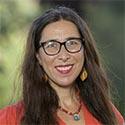 Dr. Stephanie Carroll is Dene/Ahtna, a citizen of the Native Village of Kluti-Kaah in Alaska, and of Sicilian-descent. Based at the University of Arizona, she is Associate Professor of Public Health, Associate Director for the Native Nations Institute, and Associate Research Professor at the Udall Center. Her interdisciplinary research group, the Collaboratory for Indigenous Data Governance, develops research, policy, and practice innovations for Indigenous data sovereignty. Stephanie chairs the Global Indigenous Data Alliance (GIDA), the International Indigenous Data Sovereignty Interest Group at the Research Data Alliance, and the Indigenous Data Working Group for the IEEE P2890 Recommended Practice for Provenance of Indigenous Peoples' Data.
Dr. Stephanie Carroll is Dene/Ahtna, a citizen of the Native Village of Kluti-Kaah in Alaska, and of Sicilian-descent. Based at the University of Arizona, she is Associate Professor of Public Health, Associate Director for the Native Nations Institute, and Associate Research Professor at the Udall Center. Her interdisciplinary research group, the Collaboratory for Indigenous Data Governance, develops research, policy, and practice innovations for Indigenous data sovereignty. Stephanie chairs the Global Indigenous Data Alliance (GIDA), the International Indigenous Data Sovereignty Interest Group at the Research Data Alliance, and the Indigenous Data Working Group for the IEEE P2890 Recommended Practice for Provenance of Indigenous Peoples' Data.
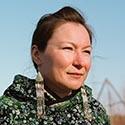 Eva Dawn Burk is Dene Athabascan from Nenana and Manley Hot Springs, Alaska. She founded Tlaa Deneldel Community Group to build an Indigenous learning center on lands reclaimed through the Nenana Land Back campaign. Eva Dawn is passionate about ecological stewardship, food sovereignty, cultural revitalization, and community wellness. She teaches people how reconnecting to the lands and waters through traditional practices is medicine.
Eva Dawn Burk is Dene Athabascan from Nenana and Manley Hot Springs, Alaska. She founded Tlaa Deneldel Community Group to build an Indigenous learning center on lands reclaimed through the Nenana Land Back campaign. Eva Dawn is passionate about ecological stewardship, food sovereignty, cultural revitalization, and community wellness. She teaches people how reconnecting to the lands and waters through traditional practices is medicine.
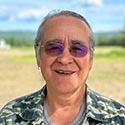 Orville H. Huntington is a retired Tribal Fish and Wildlife Biologist, with a lifetime career working with Indigenous tribes in managing and conducting research to enhance their ability to gather hunting and fishing resources in North and South America, and into Asia. He continues to serve as a volunteer on academic, state, and federal boards and councils in Alaska following the Native cultural obligatory journey by serving Indigenous peoples and all citizens of different nations as well as North America First Nations.
Orville H. Huntington is a retired Tribal Fish and Wildlife Biologist, with a lifetime career working with Indigenous tribes in managing and conducting research to enhance their ability to gather hunting and fishing resources in North and South America, and into Asia. He continues to serve as a volunteer on academic, state, and federal boards and councils in Alaska following the Native cultural obligatory journey by serving Indigenous peoples and all citizens of different nations as well as North America First Nations.
 Kaare Sikuaq Erickson leads Ikaaġun Engagement, which provides cultural consulting that focuses on bridging communication gaps between local communities in Alaska and outside entities that hope to engage with communities, most notably in the realms of Arctic Research. Sikuaq was raised in Unalakleet, Saint Michael, and Savoonga, and has family in and frequently visits Shishmaref and Utqiaġvik.
Kaare Sikuaq Erickson leads Ikaaġun Engagement, which provides cultural consulting that focuses on bridging communication gaps between local communities in Alaska and outside entities that hope to engage with communities, most notably in the realms of Arctic Research. Sikuaq was raised in Unalakleet, Saint Michael, and Savoonga, and has family in and frequently visits Shishmaref and Utqiaġvik.
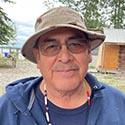 Max Taylor is a Hopi farmer, rancher and ethnobotanist. He works as a water resources technician for the Hopi Tribe. He is on the Cultural Advisory Board for the Natwani Coalition.
Max Taylor is a Hopi farmer, rancher and ethnobotanist. He works as a water resources technician for the Hopi Tribe. He is on the Cultural Advisory Board for the Natwani Coalition.
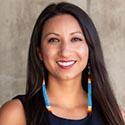 Lydia Jennings is an environmental soil scientist and Presidential Postdoctoral Fellow at Arizona State University's School of Sustainability and a Postdoctoral Research Fellow at Duke University's Nicholas School of the Environment. Lydia, a citizen of the Pascua Yaqui Tribe, completed her PhD at the University of Arizona in the Department of Environmental Sciences, with a minor in American Indian Policy.
Lydia Jennings is an environmental soil scientist and Presidential Postdoctoral Fellow at Arizona State University's School of Sustainability and a Postdoctoral Research Fellow at Duke University's Nicholas School of the Environment. Lydia, a citizen of the Pascua Yaqui Tribe, completed her PhD at the University of Arizona in the Department of Environmental Sciences, with a minor in American Indian Policy.
 Dan Ferguson is an Assistant Professor of Environmental Science and Director of the Climate Assessment for the Southwest (CLIMAS) program at the University of Arizona. A human-environment geographer, Dan contributes to and leads inter- and trans-disciplinary teams that conduct place-based, problem-oriented environmental research. The overarching goal of his work is collaborative development of relevant and useful knowledge to prepare for and respond to societal problems related to climate variability and change.
Dan Ferguson is an Assistant Professor of Environmental Science and Director of the Climate Assessment for the Southwest (CLIMAS) program at the University of Arizona. A human-environment geographer, Dan contributes to and leads inter- and trans-disciplinary teams that conduct place-based, problem-oriented environmental research. The overarching goal of his work is collaborative development of relevant and useful knowledge to prepare for and respond to societal problems related to climate variability and change.
